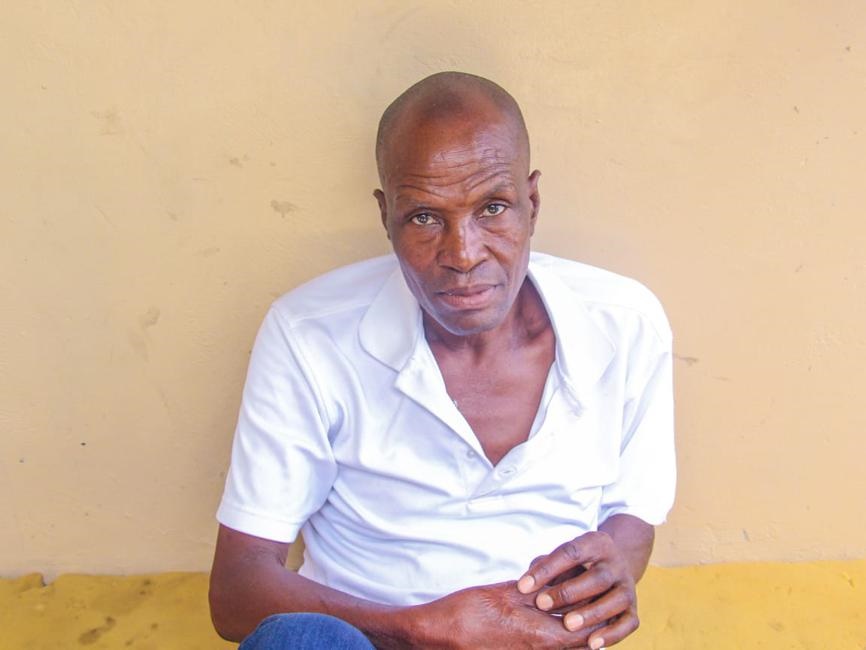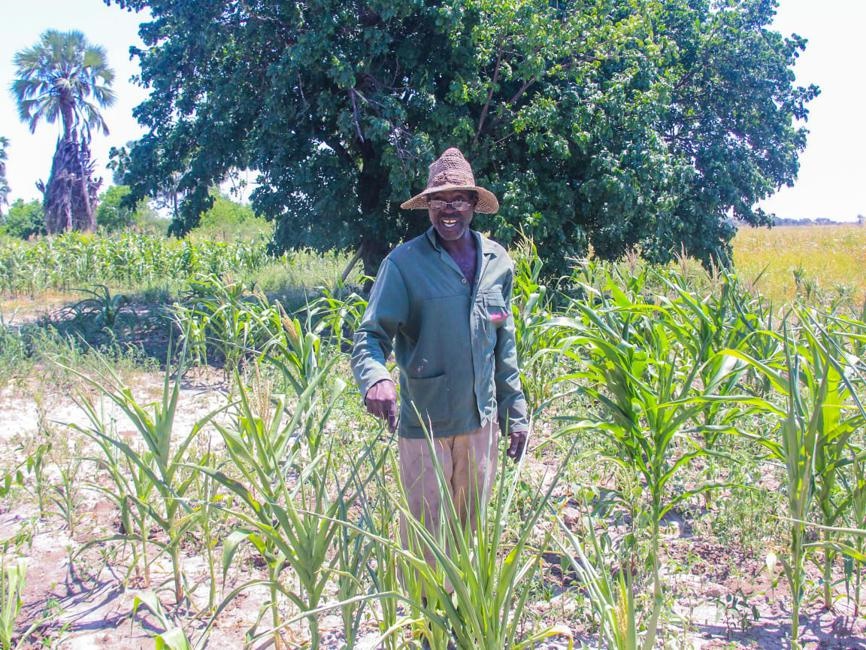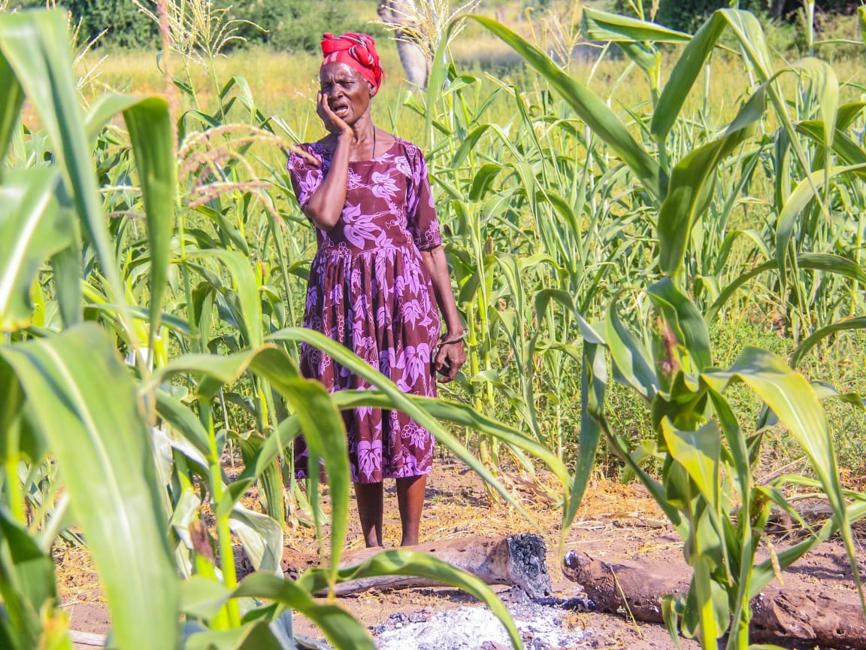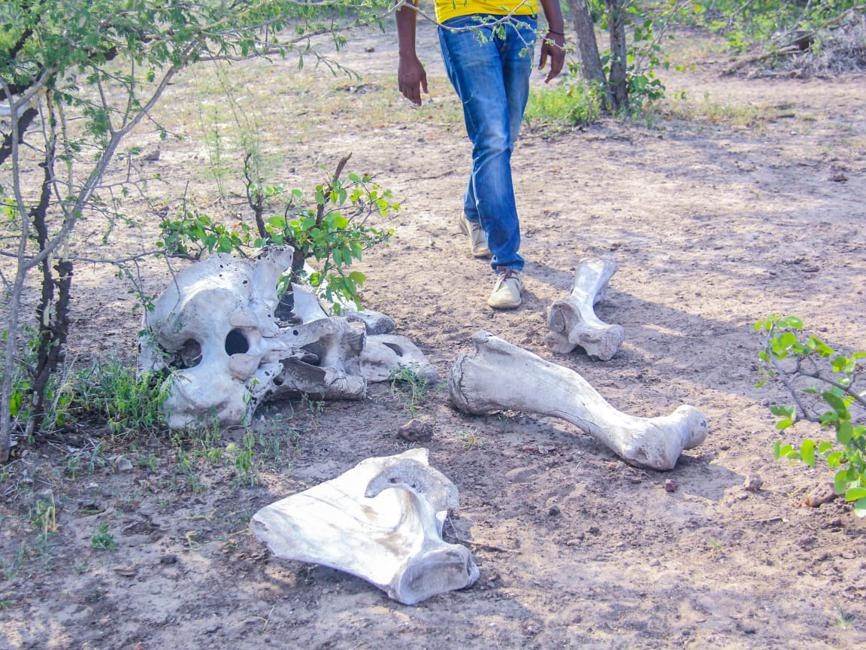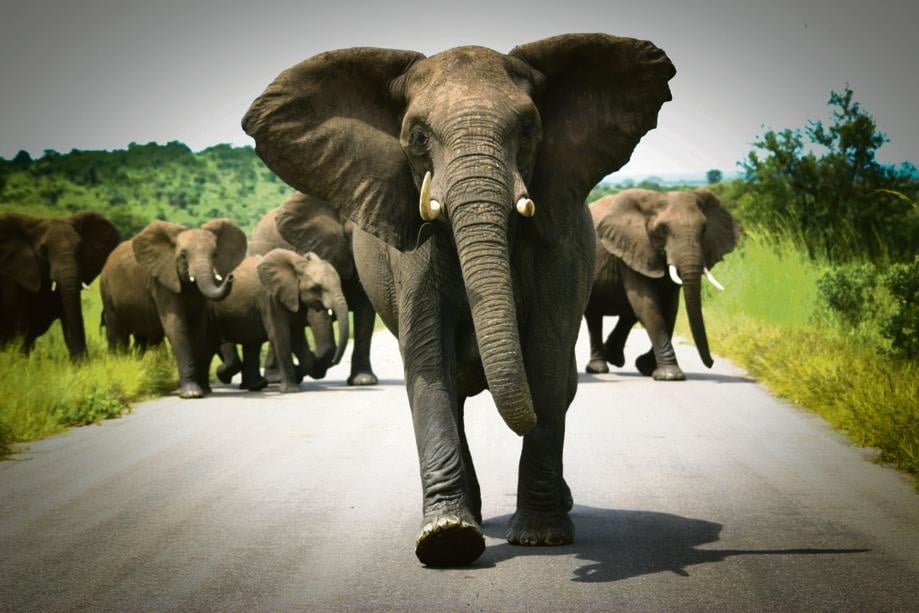
Villagers live ‘in hell’ with elephants, lions and hippos causing havoc on their land, writes Poloko Tau
Mabuta Jwanga may not remember the colour of the shirt he was wearing when an elephant attacked him, but if he could find and talk to it, he would thank it profusely for saving his life.
Faced with the world’s largest land mammal, his instinct, pumped by his experience as a wildlife guide, quickly kicked in.
Jwanga took off his shirt and threw it in the eyes of a charging elephant as he took a dive to the side.
Sitting on the veranda of his house in Satau village in northern Botswana, close to the Chobe River which marks the border with Namibia, the 59-year-old remembers lying on the ground engulfed in dust.
He was sweating in panic as the elephant stood a few metres away. Jwanga felt the vibrations as its feet hit him, convinced he would be trampled to death.
With one eye barely open, he managed to glimpse the elephant’s stomach as it walked over him.
And, once it had passed, he thought he had come out unscathed.
Jwanga was wrong.
Once the adrenalin rush faded, he began to feel something cold flowing from his hand and leg.
He was bleeding and flesh was peeled off his hand, probably caught by the elephant’s nails. His shin bone was broken.
Still, he felt lucky.
Jwanga took a deep breath as he recounted his near-death experience last week.
“Everything happened so fast. We were cutting the grass when suddenly an elephant came at us and I was the only one left in front of it. But being a former wildlife guard, a quick thought and my shirt saved my life,” he said.
“Many people in our villages have died tragically – trampled to death by elephants, mauled by lions or hit by buffaloes. I am lucky to be here and sharing my story with you.”
Satau, a beautiful village with scattered palms trees, is on the outskirts of Chobe National Park.
Chobe is not fenced and animals roam freely in and out of its borders.
On a drive on the A33 through Chobe towards the Ngoma border gate into Namibia, and a left turn into Transit road to Muchenje, other villages, including Mabele and Kavimba, are no different.
Wild animals cross the road: At sunset herds of elephant and buffalo lumber towards the Chobe River for a drink through the wildlife corridor between Kavimba and Mabele villages.
The elephant attacked Jwanga while he was cutting thatching grass to sell to feed his family, after crop farming was no longer an option.
“I left crop farming after elephants, buffaloes and other animals like hippos had harassed us for years, feasting on our crops and flushing all our efforts down the drain,” he said.
“And now here I am weakened by the elephant leaving me unable to cut that grass or tend to mealie fields and we’re still expected to cohabit with these animals when they are hurting us this much.”
The remaining farmers battle daily with the elephants and other animals. Some have given up and sold their land, but others refuse.
One of those is Matthews Samuel who sits under a tree in the middle of his mealie field.
There are empty patches through the bush showing the trail of elephants, warthogs, hippos and other animals that visit him to feast on his crops.
An electric fence borders his piece of land.
“They are my new neighbours who bought land from relatives. They are rich and can afford the fence to keep animals away but I can’t. But even so I am not prepared to sell my land to the rich because I want to do exactly what they want the very same land for,” he said.
LIFE IN A MEALIE FIELD
“God gave us land to use and make a life out of and I am not going to sell the land that God never sold me. I am going nowhere.”
Abandoned houses on smallholdings nearby bear witness to how many have given up. The land of some of those who sold up has been turned into game lodges.
Samuel said his biggest wish was for the government to help them with electric fencing so they could keep the animals away from their crops and livelihoods.
“But now the only available option is to take a bank loan and even when you are fenced, the risk may be lack of rain which might result in a poor harvest and if you can’t repay the loan they take your land. It is for this reason that I am prepared to spend every day on the farm guarding against animals, but one cannot live without a nap,” he said.
“After I sleep I walk to the field in the morning with a hat over my eyes not knowing what to expect and I would then take it off slowly. It is always a great relief seeing that no animals visited us the previous night.”
Samuel said wild animals used to know their place.
“We used to walk on foot between villages and animals would not dare attack anyone. Things changed because the animal population, especially the elephants, grew after hunting was banned,” he said.
“It was also better when people would not be arrested for killing a wild animal but these days it’s like the animals were told that they are better protected than human beings. They do as they please, harass communities and eat our crops and we’re expected to starve because of them and make peace with it. Never.”
Samuel said, if the law allowed, he would get a “real gun to shoot and kill them”. He has a gun, but only one that scares elephants off.
“They want us to beat drums to keep elephants away – not me. I use a hunting rifle and I so wish I had a real gun, I’d raze a whole herd of them if they came into my fields again.
Large elephant bones that have seen many seasons are a feature of Mabele which the villagers wish could serve as a deterrent to other elephants.
“This elephant was shot dead by a farmer after he found them eating his mealie fields. Wildlife people were called and they cut the tusks and left,” said Mompati Ntwumba, a young villager from Kavimba.
“Here, you’re unlikely to find a family that has not had a loved one killed by an elephant, lion or other wild animal. Life in our villages is hell; children are forced to be indoors early and walking around in the dark is the riskiest thing,” he said.
“Things were not like this when we grew up but today it is not unusual to see an elephant walking through the village. People are not surprised by the loud trumpeting of elephants any more … they just get worried when it gets too close to them, when they are not indoors, or it sounds close to their crops.”
Madikoko Mwezi’s eyes are red with exhaustion.
With her husband and two grandchildren, they live on a farm outside Kavimba village where they abandoned their proper house so they could guard their fields around the clock.
She points at footprints of hippos that visited the previous night.
“For the whole night, every day, I sit by the fire on the one side of the field and my husband sits with a hunting rifle on the other side with the hope that the flames will keep animals away. I scream if I see or hear elephants trumpeting nearby and he shoots in the air to scare them away,” says the 65-year-old.
“There are small ones like hippos that softly find their way to the crops and by the time you realise they are there, the damage is already done – just like last night.”
Mwezi is tired of this life “but we have no other choice”.
Samuel said the government paid him 4.80 pula (R6.49) after kudus ate six lines of his maize.
For a good harvest, he sells one head of corn for 5 pula “and now I was given 4.80 pula which is less than the price of corn and I can’t even buy anything to fill my stomach with that.
But those six lines of corn could have fed my family for at least a day.
“Once elephants come and eat your crop, pray that they eat as much as they can because you get 900 pula per hectare if you’re cleaned out,” he says.
“Surprisingly, and what is most unfair, is that if it is a hippo you get 300 pula per hectare and the explanation is that the damage is not the same. But for us, the point is we have had our food and livelihood taken away by animals.”
Jwanga said families of those killed by elephants receive 70 000 pula in compensation while survivors like him get nothing.
ROAM FREE
“I have driven in South Africa and have never seen an elephant cross the road anywhere. I believe there, people have to go to game reserves to see the wild animals unlike here in Botswana where they are allowed to roam and turn life into hell for many of us,” said Samuel.
“Even if we had money to erect electric fences, would it be a normal life for people to live behind electrified barriers while animals roam freely? Animals should be fenced in.”
All the villagers agreed that the hunting ban, introduced by former president Ian Khama, should be lifted.
“People used to get hunting permits allowing them to shoot only a specified number of certain animals per season and that was taken away,” Samuel said.
“We are now expected to buy wild meat from butcheries and supermarkets and still cohabit with the same animals. Who are those who are allowed to kill and sell to us?”
Meanwhile, a war of words is simmering after Khama’s successor, President Mokgweetsi Masisi, said he intended culling elephants and lifting the hunting ban.
Masisi said recently that Botswana was home to 130 000 elephants which was more than the country could handle. Of these, about 50 000 stray outside their designated areas.
Masisi has received widespread criticism from animal rights activists, but his intentions have been widely welcomed at home by affected communities and their sympathisers.
Although her husband uses a hunting rifle to scare elephants away, Mwezi believes the best option would be to fence the wild animals in.
“If I could, I’d order for all these animals to live inside a fenced park. Why is it happening almost everywhere and not here where we stay? It has been proved that they cannot live side by side with human beings. It is sad that animals appear to have more rights than us.”
People living on the outskirts of Botswana’s game parks are anxiously waiting to see if the government is going to do anything to stop roaming wildlife from killing villagers and eating and destroying their crops.
The government is in the process of debating whether to cull elephants, revoke the 2014 ban on hunting or try to keep the wildlife off villagers’ land.
Communities living on the outskirts of fence-less, state-owned parks and forest reserves say their lives are proof that wild animals cannot coexist harmoniously with human beings.
Botswana President Mokgweetsi Masisi appears to be sympathetic to the plight of these communities who are attacked and killed by wild animals and whose crops are eaten and destroyed.
He is now considering recommendations by a special cabinet subcommittee on the issue.
Culling and hunting options have sparked widespread opposition and criticism from animal rights groups and conservationists.
Masisi was adamant, however, that his government was not going to be dictated to.
“It bamboozles me when people sit in the comfort of where they come from and lecture us about the management of species they don’t have.
“They want to admire from a distance and in their admiration of those species, they forget that we too, the people of Botswana, are a species. They talk as if we are trees and the grass that elephants eat,” he said.
Masisi recently tweeted: “We have a problem with human wildlife conflict. I never said we will go all out and kill all elephants in Botswana. We are under attack and these people are acting in concert with some Batswana … I am not going to be intimidated while wildlife kills our people.”
A political twist has found its way into the big elephant debate with suggestions that Masisi is trying to undo what his predecessor Ian Khama left in place.
The two have been at loggerheads over governance with Masisi doing away with most of Khama’s policies.
Khama introduced a moratorium on hunting when Masisi was still his vice-president in 2014.
The former president is not happy that his successor is now pushing to revoke the moratorium.
Masisi recently suggested that elephant’s meat from culling should be canned as pet food.
A Botswana veterinary surgeon, Erik Verreynne, said the lack of fencing around national parksand game reserves in Botswana was themain problem.
The “only way to prevent large-scale bloodshed is to prevent elephants from entering” areas where people live and that “introduces the option of fences”.
In what appears to be a crusade to justify culling and hunting as options, the Botswana government has said:
- 25 people have been killed by elephants between 2009 and this year so far;
- Botswana has an elephant population of 130 000 against its carrying capacity of 54 000;
- More than 70% of the elephant population lived outside their designated areas. – Poloko Tau
TALK TO US
Should culling and hunting be allowed? Or should animals be fenced in to stop them killing people?
SMS us on 35697 using the keyword CULL and tell us what you think. Please include your name and province. SMSes cost R1.50. By participating, you agree to receive occasional marketing material
| |||||||||||||
| |||||||||||||




 Publications
Publications
 Partners
Partners




